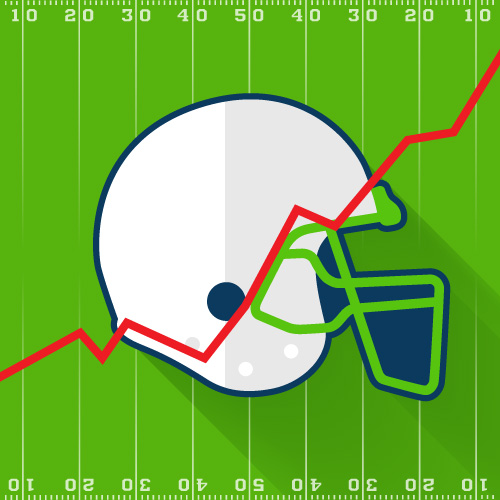 BY JASON NORRIS | GUEST CONTRIBUTOR
BY JASON NORRIS | GUEST CONTRIBUTOR
Investor returns in January usually predict what the returns will be for the entire year. The Seahawks win may offset this calendar trend.
 BY JASON NORRIS | GUEST CONTRIBUTOR
BY JASON NORRIS | GUEST CONTRIBUTOR
The results of Super Bowl XLVIII are now in the books, and historically the games have had an impact on investors’ portfolio for that calendar year. While I was pulling for the Seahawks and was pleased with the results, their win may also be beneficial for equity markets. Although correlation does not lead to causation, historically, if a team from the NFC wins the big game, the S&P 500 is positive 80% of the time. Now that the Seahawks have made the move to the NFC, this win “may” portend a positive gain for equities.
While strictly following seasonal and/or cyclical indicators is not advised, we do pay attention to them. With the S&P 500 down more than three percent for the year, there is another historical indicator that some investors follow. The returns in January usually predict what the returns will be for the entire year. Since 1950, this “January Barometer” has a batting average of 80%. While not perfect, it is an interesting factoid. Therefore, we are hopeful that the Seahawks win will offset this calendar trend.
As an aside, the Seahawks have been a great investment for owner and former Microsoft co-founder, Paul Allen. He bought the team in 1997 out of “civic duty,” and since then it has increased in value six-fold, while his Microsoft stake has “merely” doubled.
Down a Hole
Global equity markets began the year much like the Broncos started the Super Bowl: in the hole. Investors continue to be disheartened with emerging markets events as well as with the Federal Reserve’s taper policy. Currency devaluations and higher interest rates are resulting in a “risk-off” trade for global investors. This sell-off has not been limited to just emerging markets. As we have seen here in the U.S., global developed markets felt the effects as well. The global markets (as measured by the MSCI All-World Index) are down five percent for the month of January. These risk-off trades have resulted in developed market interest rates declining meaningfully. The 10-year U.S. Treasury yield started 2014 at three percent and is now trading at 2.65 percent. Yields in Germany and the UK have dropped by similar levels.
We believe that the Fed’s taper policy is having more of a psychological effect than an actual impact. If you look at the Fed’s balance sheet, the “tapering” that is occurring is still resulting in money going into the economy. Rather than buying $80 billion in Treasuries and mortgage bonds, they are now purchasing $65 billion and will be reducing that over the course of the year. Their balance sheet is, in fact, still growing. We do not believe the Fed will liquidate any of their holdings. Instead, they will let bonds mature over time and therefore we see no immediate tightening of money in the economy.
Jobs Heading in the Right Direction
The employment picture continues to improve slowly with the most recent report of 142,000 private jobs created in the month of January. This brings the total private sector jobs just under its 2007 peak of 116 million. We anticipate that we will start seeing a pick-up in the public sector in 2014 due to a pick-up in state and local hiring. Tax receipts across the nation for local governments are close to record highs and have been growing at a solid 3 to 5 percent the last four years.
Portland is experiencing this positive growth as well and is just shy of recouping all the jobs lost in the recession that started in 2008.
Still Upbeat
While the sell-off year to date is disappointing, we are still constructive on equities, especially developed market equities. The recent volatility in equities has resulted in a record amount of selling in equity mutual funds for the week ending February 7. $28.3 billion was pulled out of equity funds and ETFs and the majority of that cash moved to the proverbial mattress. Earnings for U.S. companies have been relatively healthy with over 70% of companies having reported surpassing expectations. While we have seen some uncertainty in some parts of the earnings reports, specifically enterprise technology, we still like the overall market.
Therefore, unlike the Denver Broncos in Super Bowl XLVIII, we believe the lead that the market “bulls” have given the “bears” is far from insurmountable and that by year-end, equity bulls will prevail by posting a total return that is historically consistent with an “average” year of approximately 10 to 12 percent.
Jason Norris, CFA, is executive vice president of research at Ferguson Wellman Capital Management. Ferguson Wellman analysts blog on the financial markets for Oregon Business.
Disclosures:
Opinions and statements of financial market trends based on current market conditions constitute our judgment and are subject to change without notice. Due to the rapidly changing nature of the financial markets, all information, views, opinions and estimates may quickly become outdated and are subject to change or correction. We believe the information provided is from reliable sources but should not be assumed accurate or complete.
Reference to or by non-employee individuals and institutions herein does not serve as an endorsement of, or testimonial for, Ferguson Wellman’s investment strategies and services. The information published herein is provided for informational purposes only, and does not constitute an offer, solicitation or recommendation to sell or to buy securities, investment products or investment advisory services. Nothing contained herein constitutes financial, legal, tax or other advice. The appropriateness of an investment or strategy may not be suitable for all investors and will depend on an investor’s circumstances and objectives.

 BY JASON NORRIS | GUEST CONTRIBUTOR
BY JASON NORRIS | GUEST CONTRIBUTOR

